Creative Contingencies
Making Peace With My Day Job(s)
In 2005, I was a newly minted Theatre Performance college graduate, primed to take the plunge into the “real world” of New York City, the theatre Mecca of my childhood fantasies. I had a vision of what my big, creative life would look like: by day, I would audition, work on my writing, and study acting with the best teachers. By night, I would rehearse in tiny studios and perform in spaces around the city with my fellow actors, growing my network and my resume. On top of all this, I would frequent art galleries, stroll through Central Park, and brunch at sidewalk cafes, sipping coffees and working on the New York Times Sunday morning crossword. Inspiration would find me in these carefully constructed moments. This was my plan.
Where I actually found myself after graduation was living with my parents in my old bedroom in Western New York. Reconciling my job as a Hollywood Video clerk (which I needed to pay off my looming student debt) with my all-too-recent dream of creating theatre full time felt like throwing cold water on a once burning blaze. It was devastating. I took an acting class and wrote a bit, but I didn’t feel like a “real” artist. I felt I had failed somehow because I needed a day job.
It's foolish to keep putting contingencies on being creative. Although I would love to have more time to pour into creative projects, I am making peace with day jobs. While I once lamented that I was likely to have a dozen more different day jobs during the course of my life, now I gaze into that future with a bit more wonder, curious about what those roles will be, and what those experiences will break open for me.
For the last decade, I've maintained this dual identity as both a theatremaker and a day job professional. As I've slowly grown my acting resume, my day job resume has grown right alongside it: a children’s museum associate, a lumber yard receptionist, a waitress at Bob Evans, a substitute teacher, a catering assistant, a temp assistant to a circuit court county judge, and a surgical scheduler at a cancer center. The list continues to grow with each passing year.
"I can't really be creative until...” I fill in the blank with all sorts of conditions: until I get a job in my field, until I pay off my student debt, until I have more time, until I don’t need to have a day job at all. The problem with these theories quickly becomes clear. Even as I've juggled day jobs over the last ten years, I've managed to carve out enough time and energy to write two books, three plays, blog on a regular basis, perform on stage and in film, complete a Master's degree in theatre education, teach creative drama, and co-found two theatre companies. My fear that a day job will stunt my creativity has been, for the most part, unfounded. I haven't been creative in spite of my day jobs, but rather in cooperation with my day jobs.
Having a day job has given me the financial stability to pay my rent and buy my groceries without worry. But on a deeper artistic level, having a day job has thrown me headfirst into the world in which I live; allowed me to step outside the darkness of a black box theatre to bathe in the light of the reality beyond. Job interviews, subway commutes, rushing to meet a deadline, letting myself really feel the tidal wave of anxiety, joy, and frustration that accompany a life outside the theatre—these are the precious ingredients that nourish me as an actor and playwright. Every day interactions become studies of human nature. Conversations I overhear in the cafeteria swim in my head as the seeds of dialogue. Co-workers begin as strangers, grow into friends, and emerge as some of my biggest supporters of my theatre work. My day jobs are unexpected experiences of truth for me. How can an artist reflect truth onstage if she never experiences truth offstage?
Now, when I think of turning back time and revisiting those first few painful years coming out of school, I feel immense gratitude. I wouldn’t give them back. They have helped to make me who I am as an artist. Recently, I had the joy of seeing my first ten-minute play performed at a festival. The play is based on a male breast cancer survivor I met while working at a hospital; without that job, there would be no play. I’ve begun embracing this symbiotic relationship; when you look closely, it’s a beautiful dance.
It's foolish to keep putting contingencies on being creative. Although I would love to have more time to pour into creative projects, I am making peace with day jobs. While I once lamented that I was likely to have a dozen more different day jobs during the course of my life, now I gaze into that future with a bit more wonder, curious about what those roles will be, and what those experiences will break open for me.
The great Buddhist monk Thich Nhat Hanh talks about this interdependency in nature:
When we look deeply into a flower, we see the elements that have come together to allow it to manifest. We can see clouds manifesting as rain. Without the rain, nothing can grow. If we take the clouds and the rain out of the flower, the flower will not be there. Without the sun nothing can grow, so it’s not possible to take the sun out of the flower. The flower cannot be as a separate entity; it has to inter-be with the light, with the clouds, with the rain.
This is how I like to think of us as theatremakers: artistic beings composed of many "non-artistic" elements. Rather than confine ourselves to the stage, I think it is in our best interests to make sure that our life outside the theatre is filled with as many different “non-theatre” experiences as we can cultivate. Only when we dive deeply into the ocean of human experience can we explore what it means to exist, to strive, to struggle, to forge meaning. Isn’t that the story we wish to tell to audiences as well? Instead of giving up our day job, perhaps our goal should be to use everything we can from it. Don't waste any of it. Let's learn to sift through all our “different than we dreamed” experiences, and from the imperfection that we find, give thanks, and create something magnificent.

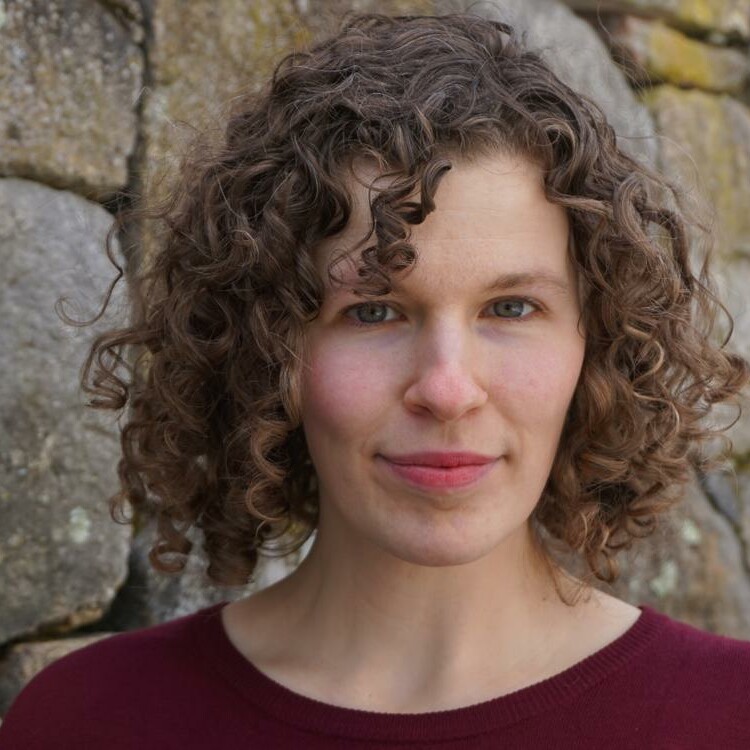
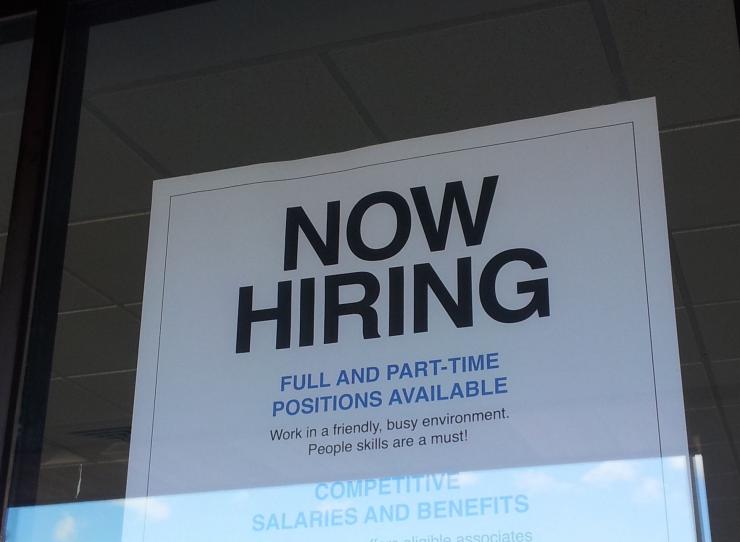
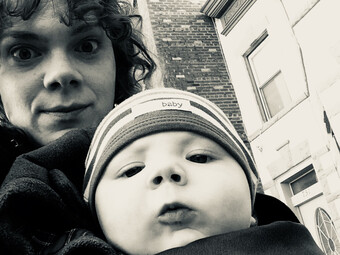

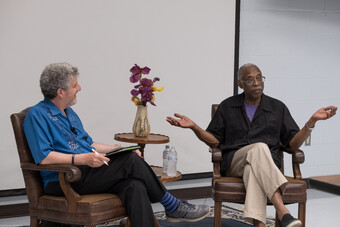

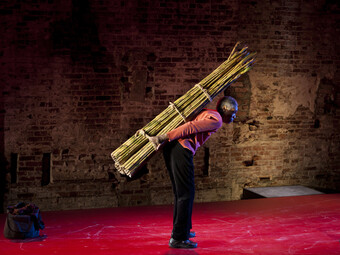


Comments
The article is just the start of the conversation—we want to know what you think about this subject, too! HowlRound is a space for knowledge-sharing, and we welcome spirited, thoughtful, and on-topic dialogue. Find our full comments policy here
I spent 10 years as an office temp, which in retrospect was the greatest day job for a playwright. Typing a letter and typing a play look really similar.... I'll never regret those years and the safety net of a job that paid the bills. Now that I can support myself as a playwright, I have a greater appreciation of time and good fortune. I wonder if I would have had that in my 20's (Oh get real, I know I wouldn't have).
I follow and teach the full time day job with the full time artist profile. How can we get every college student majoring in the arts to read this article? If only all universities taught the "Life of the Artist."
Thanks for the support! "Life of the Artist"...now that sounds like a course I want to teach! I have spent a long time thinking about how to have this conversation with artists coming out of high school or college--a balance of preparing them for realistic expectations but also encouraging them to pursue what it is they love. It's a delicate balance, but the more I embrace it, the more content I feel as an artist and a person.
A very good article. I've always thought that art needn't and shouldn't
be created in a vacuum. Granted it would be fab to work part time or
have the 4 hours a day I commute back, but even that time I put to good
use. My issue is that the only legitimate side car career is teaching.
I would find the politics of teaching, PTAs, and the like counter
productive to anything creative. I have worked in corporate, non-profit, law and let me tell you there is no limit to the curiosities you can find there.
I think that's one of the biggest realizations for me: if I was doing nothing but theatre, what would I be drawing from for inspiration? Thanks for the kind words, Virgina.
Yes, yes, yes! I constantly ask my performance students (and myself): "What can you possibly say about life or contribute to your community if you are constantly walled up in the studio or theatre?" You MUST go live. And work. And struggle. And be mundane. There are worlds in these experiences.
Also, for me, it isn't "slumming" or "gaining valuable experience," it's my survival. It's real. This may be the only way we combat what I perceive to be an increasingly classist, elitist trend in our field: by celebrating those that do not have the family support or financial security to take a "risk" on being a full-time creative whatever. Having a "day job" has freed me up to do MORE experimental work, because I could take the risk knowing I was getting a regular paycheck. It keeps me out of a "gigging" mindset...
Thanks for these words.
"What can you possibly say about life or contribute to your community if
you are constantly walled up in the studio or theatre?" A huge YES! I am very much on board with theatre being accessible not only to audiences, but to the artists themselves. When artists come to terms with the need for a day job and stay involved in the craft, it's an important gain for everyone.
This makes a lot of sense to me. I too had some strangely idealistic and idyllic life planned when I graduated only to quickly learn there are bills to pay and health insurance to be gained, while life as a theatre artist can less than lucrative. I've adjusted my expectations, and now feel like the theatre ambassador to many day-job coworkers, guiding them to see the better shows and always happy to talk about my current projects when asked.
I love the idea of being a theatre ambassador--thanks for the thoughts!
This inspires me to continue to live one life rather than two or three or more. Working, teaching, parenting, writing, making theatre... it can all be part of one effort. Thanks Melissa!
I have a habit of thinking of my life as separate pieces as well, but imagining them as part of a whole is so refreshing. Thanks for sharing!
I'm in a precarious position where, in my mid-40's, I have a day job that pays better than I can ever realistically hope to earn as an artist, so my motivation to go Equity and pursue acting to the exclusion of all else has markedly waned in the face of (relative) financial comfort, great health insurance, and the need to save for adoption, a house, a life with my soon-to-be-husband, retirement, and the financial reality of living in a very expensive area (Boston ain't cheap). This has not, by any means, signaled my artistic death. On the contrary, my 20-plus years spinning the multiple plates of career, art and relationships has made me a stronger performer. I don't need to struggle or starve to be an artist.
I cannot agree enough with your sentiment that you don't have to struggle or starve to be an artist! We are still so stuck with this glorified idea of the "struggling artist", but in reality, worrying about where your rent money will come from doesn't give me inspiration, only intense anxiety. All the best to you!
Fantastic article. I want to add that carving out time to be creative (in concert with my day job) has made me a more resilient artist. If an artist waits until conditions exactly match his or her expectations, many years are likely to pass. That artist will be quite out of practice when he or she is finally "ready" to start making work. I hope that my own art in ten or twenty years will be built on a deep and sturdy foundation of life experience and continual creative practice, with or without the day job.
I agree! As someone who can be a perfectionist, I'm constantly fighting the urge to wait for the "right time" to create. I think there is so much to be said about stubbornly creating in the face of whatever life brings, day job or not.
Wonderful! This has been my experience, as well. Lately I have enjoyed describing my day job +/= art life this way: "I am my own patron."
"I am my own patron." I love that!
Though WNY is home, I am now based out of Boston!
Are you still in WNY? I would love to meet! (Donna Hoke)